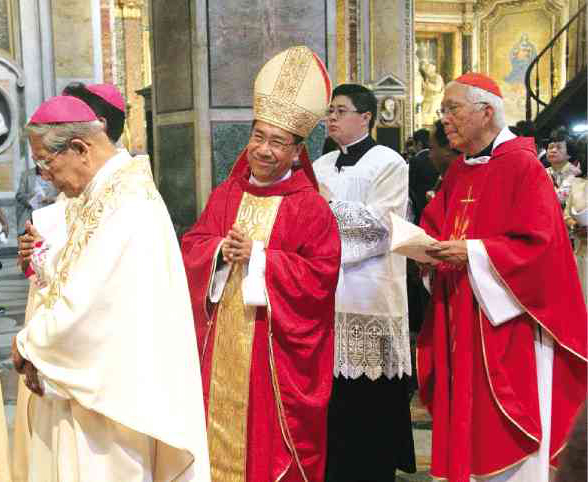
PHILIPPINE Catholic leaders are urged to send out more Filipino priests to minister to the increasing number of Filipinos overseas. FILE PHOTO
Roman Catholic priests are declining in number in the United States. This is based on the study that was conducted in 2013 by the Center for Applied Research in the Apostolate at Georgetown University. Filipino immigrant priests are commonly assigned to preach in various US churches especially in cities where Filipino parishioners are predominant. Most of these priests obtained either the R visa or the special immigrant visa as religious workers. While most religious workers’ visas are approved, there are also applications that are unfortunately denied. What typical case would result in the denial of a religious worker visa?
Dave was a holder of a student visa (F1) when he was offered a job as a minister for a local church. He used his optional practical training’s employment authorization to work for this church. After six months of working, the church filed a petition for a special immigrant visa or green card for him. The visa was denied and he was told that, after a site visit investigation, it was discovered that the church was not paying Dave and that he was not working full-time for his petitioning church.
The regulations relating to religious worker visas are clear. The applicant must be compensated both for the two years prior experience and for work with the petitioner. Both can be satisfied by salaried compensation or nonsalaried compensation.
Guarding against fraud
The US Citizenship and Immigration Service’s Office of Fraud Detection and National Security (FDNS) had made a study and concluded that there was pervasive fraud (33 percent) in the religious worker visa program. Under amended regulations the FDNS conducts mandatory investigations of religious worker petitions. Fraud investigators are expected to visit employer-church locations to verify evidence submitted together with the petitions. Site visits may include a tour of the facility, a review of employer records and interviews with relevant personnel at the facility.
Note that religious worker visas previously issued may still be revoked because of findings of fraud after investigation.
Site investigation of the petitioning church or organization has been a mandatory requirement for every religious immigrant visa case, whether or not fraud is suspected.
In the case of Dave, his two years of membership and experience with the church was not proven because he was a student prior to working for this church. The regulations require that his two-year work experience must be paid. He also was not working full-time contrary to his attestations in his petition. Hence, his religious worker visa was denied.
Temporary and permanent
The R visa is the temporary religious worker visa designed for ministers and those working in religious occupations or vocations. The initial admission period is 30 months with extensions available in 30-month increments for up to five years. Part-time employment is permissible provided it has an average of at least 20 hours a week.
Direct applications for R1 visas at the US Embassy in Manila are no longer accepted unlike in the past. All R1 visas begin with the filing of the Form I-129 and the R1 Supplement and fee with the California Service Center.
To qualify for the R visa, the applicant must have been, for the two years immediately preceding the application, a member of a religious denomination having a bona fide nonprofit, religious organization in the United States.
The religious worker must be coming to work in one of three capacities: (1) as a minister of that religious denomination or for the organization or tax-exempt affiliate in a religious vocation, or occupation in either (2) a professional capacity or (3) a nonprofessional capacity.
Successful priest stories
The permanent visa for religious worker falls under the employment-based fourth preference or the special immigrant worker category. Unlike the nonimmigrant R visa, the special immigrant worker must also demonstrate that he or she has carried on the vocation (as minister) or occupation as a professional or nonprofessional continuously for a period of at least two years immediately before seeking admission as an immigrant. These two years of qualifying experience must have occurred after age 14 and, if in the United States, must have been authorized by the government.
Many priests and other faith leaders are beneficiaries of religious worker visas. For Filipinos in the US, religion plays an important role in our everyday lives as immigrants. In many ways, the priests, religious ministers and leaders have the capacity to strengthen not only the immigrant as an individual but the Filipino community in general by empowering us through prayers or regular religious activities. A classic example is Msgr. Fred Al. Bitanga who is a well known Catholic priest (now retired) in the San Francisco bay area. As the parish priest for 45 years, he successfully ministered to thousands of Filipino families. He was able to turn St. Patrick’s Church from a predominantly Irish parish to a Filipino dominated one. By following the rules on applying for R visa and the special immigrant visa, hopefully, there will be more Filipino immigrant priests, pastors, ministers and religious leaders to cater to the increasing Filipino immigrant population.
(Atty. Lourdes Tancinco may be reached at law@tancinco.com or at 7211963 or visit her website at www.tancinco.com)

